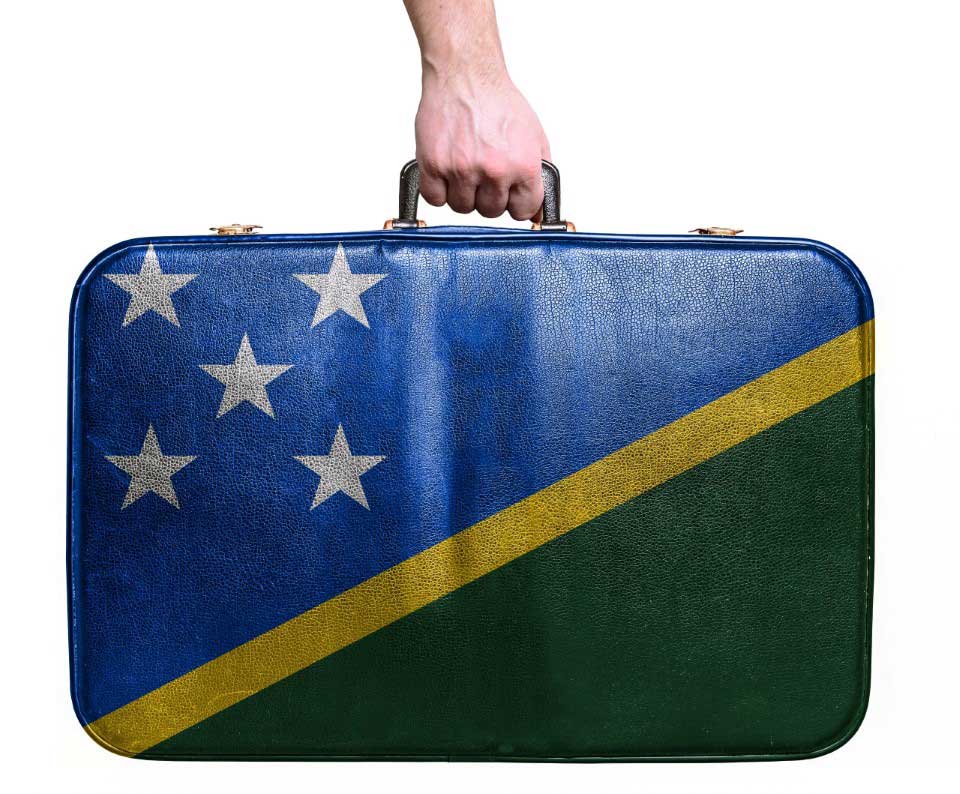Travellers
This information applies to anyone arriving in Solomon Islands from other countries by air or sea including: Solomon Islanders returning home, missionaries, crew from ships, aircraft and yachts, diplomats and VIPs, business people, and tourists.
 On Arrival - Declare it!
On Arrival - Declare it!
While arriving in Solomon Islands you will be given an Incoming Passenger Card. This is a legal document.
- All animals or animal products, plants or plant products and other risk items must be declared.
- Declared items will be assessed by a Biosecurity Solomon Islands officer during your border clearance.
- You will not be penalised so long as all items are declared.
If you fail to dispose of any biosecurity risk items prior to inspection, or you fail to declare or make a false declaration:
- You will be caught.
- You could be prosecuted, fined up to SI$1,000,000 and risk up to 5 years jail and a criminal record.
You must declare all risk items, including:
- Food – including chocolates, lollies, candies and sweets.
- Vegetables – fresh, frozen, dried or cooked.
- Fruits – fresh, frozen, dried or cooked or preserved.
- Plant & plants cuttings – crop and ornamental plants, bulbs, corms, rhizomes and tubers, live, frozen or dried.
- Seeds – including commercially packaged.
- Nuts – raw and unprocessed.
- Straw and straw handicrafts - including packaging, and artifacts and costumes, bamboo, cane, rattan, basket ware, mats, pine cones and potpourri.
- Live Animals – inc. domestic pets, birds, fish and reptiles.
- Meat and meat products – fresh, frozen, dried, cooked or preserved
- Egg and egg products – including egg cartons and moon cakes
- Animal Remedies – vaccines
- Pet food of animal origin
- Biological cultures and organisms – blood samples and specimen
- Dairy Products – cheese, milk, milk powder and butter
- Honey – including pollen, honey comb, bee wax, propolis
- Hunting trophies - feathers, bones, horns, tusks, furs, skins
- Riding equipment - saddles and harnesses
- Camping equipment – including hiking boots
- Sports gear – shoes/boots, hockey sticks, golf clubs, etc.
- Soil – including samples for scientific research
Certain commercially packaged and labelled plant products may be imported without a permit so long a they have been declared and passed inspection.
- Cooked fruit and vegetables
- Pickled fruit and vegetables
- Cooked plant products
- Preserved fruit and vegetables
- Fried plant products
- Processed nuts (in their final processed form, i.e. shelled or hulled)
- Freeze dried plant products
- Spices
- Frozen fruit and vegetables
Certain commercially-produced packets of processed food products with ingredients of animal origin, labelled as having been produced in Australia or New Zealand may be imported without a permit so long as they have been declared and passed inspection.
- Tinned foods
- Seafood
- Pet food (canned meat or biscuits)
- Biscuits, cakes, pastry, noodles (cooked, with egg or honey ingredients)
- Processed dairy products (butter, cheese, cream, ice-cream, infant food, pasteurized/UHT milk)
- Egg (cooked – non fertile in hermetically sealed containers)
- Health Foods containing bee products, including bee venom, pollen, propolis, royal jelly (must be processed and prepared as encapsulated doses such as tablets or capsules).
- Processed beeswax (candles, cosmetics, foundation, ornaments, polishes)
- Feathers (new dusters, hats, lures, bleached, curled or waved)
- Furs (manufactured)
- Leather (new and fully manufactured)
- Saddles and saddle harnesses (new)
- Wool (processed)
Remember
You will not be penalised so long as all items are declared, even if they are not allowed into Solomon Islands.
If items of biosecurity concern are found during the inspection a Biosecurity officer may give you the option of treating the goods (at your cost); after treatment they will be returned to you.
If you wish to carry any items not listed above, you may need an import permit. Go to our Importers page.
FAQ - Common Questions